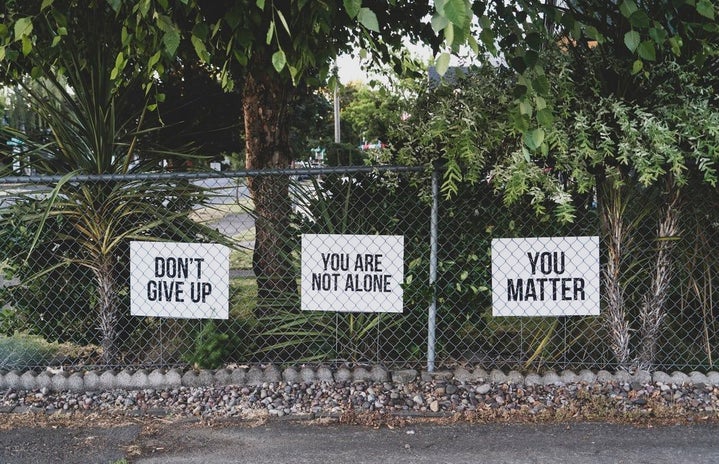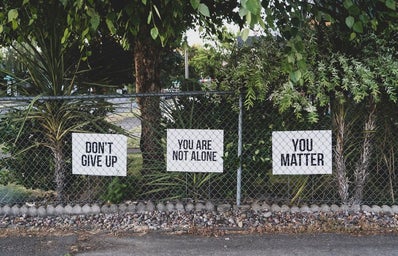TW: This article mentions mental health and suicide. If these are sensitive topics for you, please be cautious in continuing.
Mental health (n.): a person’s condition with regard to their psychological and emotional well-being.
In today’s society, there are so many stigmas attached to being “mentally ill.” So much so that when people are struggling with their mental health, oftentimes they are afraid to talk to someone or to seek help in fear of being judged or labeled as “broken.” But please, PLEASE know that you can and should always seek help if you feel that you or a loved one is in need, especially during the COVID-19 pandemic. Many studies have shown an increase in numbers of people who feel lonely, hopeless, and restless. This is understable– human beings are a very social species and being isolated or quarantined for the sake of one’s physical health can take a negative toll on one’s mental health. This is all the more reason to stay vigilant and make sure to set aside time to take care of yourself, both mentally and physically.

September is National Suicide Awareness Month. In honor of this month, I want to share some resources that are easily accessible, how to spot warning signs in someone that may be spiraling on a suicidal path, and how to best support someone who is struggling with their mental health.
Below are several hotlines that you can call at any time if you or a loved one is struggling with your mental health.
The National Suicide Prevention Lifeline: 1-800-273-8255
The Trevor Project: 866-488-7386
Mental Illness Hotline: 1-800-656-4673
Text “HOME” to the Crisis Text Line at 741741
The Trevor Project offers support to the LGBTQ+ young adult community. Both of these hotlines are available 24/7. For an extended list of hotlines not necessarily related to mental health, please see https://spoonuniversity.com/healthier/7-hotlines-that-exist-in-case-you-need-them.
Many college campuses have free counseling programs, which can be extremely helpful if you are inclined to seek professional help. Personally, I have gone to therapy numerous times to help with my anxiety and I definitely would encourage you to go. Therapy provides a safe environment to talk about your struggles and receive advice on how to handle emotionally difficult times. I have my therapist’s number in my phone and any time I need to reach out, she is always there to help. Having a support system at your fingertips is a very comforting thing.

According to save.org, warning signs to look for in someone you may suspect to be depressed or suicidal include but are not limited to:
-
Talking about wanting to die or to kill oneself
-
Looking for a way to kill oneself
-
Talking about feeling hopeless or having no purpose
-
Talking about feeling trapped or being in unbearable pain
-
Talking about being a burden to others;
-
Increasing the use of alcohol or drugs;
-
Acting anxious, agitated, or reckless;
-
Sleeping too little or too much
-
Withdrawing or feeling isolated
-
Showing rage or talking about seeking revenge; and
-
Displaying extreme mood swings
If anyone you know shows these symptoms, please know that is it more than OK to check on them and let them know that they are loved and valued. A simple “hey, I hope your week is going well. I just wanted to let you know that I care about you, and if you ever need to talk, I’m always open to listening” can go a long way. If at any point you think they are seriously considering suicide, it is time to intervene. This can look like letting an adult know, calling a therapist or mental health hotline, or even taking your friend to the hospital for their own safety.
According to healthline.com, here are ways to help a friend or loved one who is struggling with their mental health:
-
Listen to them and be understanding
-
Help them find support
-
Support them in continuing therapy
-
Learn about depression on your own
-
Offer to help with everyday tasks that may be mentally overwhelming to the other person
-
Extend loose invitations
-
Be patient
-
Stay in touch– even if the other person has a hard time reciprocating
-
Know the different forms that depression can take
-
Don’t take things personally
Remember, everyone struggles with something. The battles of some may feel bigger or smaller than the battles of others, but know that whatever issues you or your loved one(s) are going through, are valid and you are loved. You will get through this. It is important to be kind and accepting of one another and to watch individuals who are struggling with their mental health for signs of depression and/or suicidal thoughts or action. Together, we can reduce the stigma around mental health and help others to know that there is no shame in reaching out and asking for help. #SuicideAwarenessMonth2020



